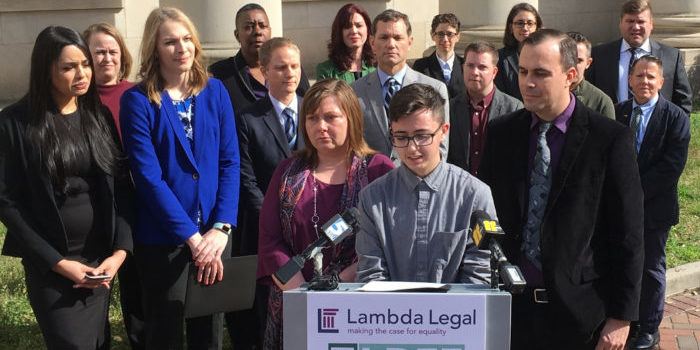(Headline USA) A federal appeals court is considering cases out of North Carolina and West Virginia that could have significant implications on whether individual states are required to cover health care for transgender people with government-sponsored insurance.
The Richmond-based 4th U.S. Circuit Court of Appeals heard oral arguments in cases Thursday involving the coverage of transgender care by North Carolina’s state employee health plan and the coverage of gender-transition surgery by West Virginia Medicaid.
During the proceedings, at least two judges said it’s likely the case will eventually reach the U.S. Supreme Court.
Both states appealed separate lower court rulings that found the denial of such discretionary healthcare to be discriminatory and unconstitutional.
Two panels of three Fourth Circuit judges heard arguments in both cases earlier this year before deciding to intertwine the two cases and see them presented before the full court of 15.
Tara Borelli, senior attorney at Lambda Legal—the organization representing transgender people denied services in both states—claimed excluding the coverage was a violation of the 14th Amendment.
“The exclusion here is actually quite targeted, it’s quite specific,” Borelli said in court, arguing that a faithful interpretation of the U.S. Constitution and the equal protection clause ensures transgender people coverage.
“One of the most important things that a court can do is to uphold those values to protect minority rights who are not able to protect themselves against majoritarian processes,” she said.
Attorneys for the state of North Carolina said the state-sponsored plan is not required to cover hormone therapy or surgery because being transgender is not considered an illness.
Attorney John Knepper claimed only a subset of transgender people suffer from gender dysphoria, a diagnosis of distress over gender identity that doesn’t match a person’s assigned sex.
Knepper said North Carolina’s insurance plan does not discriminate because it does not allow people to use state health insurance to “detransition,” either.
Before offering pharmaceutical or surgical intervention, medical guidelines call for thorough psychological assessments to confirm gender dysphoria before starting any treatment.
In updated treatment guidelines issued last year, the World Professional Association for Transgender Health said that patients should be told about the possibility of later regret during psychological counseling.
West Virginia attorneys said the U.S. Centers for Medicare & Medicaid Services has declined to issue a national coverage decision on covering transgender surgery.
Caleb David, attorney for the state defendants, said West Virginia’s is not a case of discrimination, either, but of a state trying to best utilize limited resources. West Virginia has a $128 million deficit in Medicaid for the next year, projected to expand to $256 million in 2025.
“West Virginia is entitled to deference where they’re going to take their limited resources,” he said. “They believe that they need to provide more resources towards heart disease, diabetes, drug addiction, cancer, which are all rampant in the West Virginia population.”
Unlike North Carolina, the state has covered hormone therapy and other pharmaceutical treatments for transgender people since 2017. “That came from a place of caring and compassion,” he said.
There’s no indication of when the court will rule.
In June 2022, a North Carolina trial court demanded the state plan pay for “medically necessary services,” including hormone therapy and some surgeries, for transgender employees and their children.
The judge had ruled in favor of the employees and their dependents, who said in a 2019 lawsuit that they were denied coverage for transgender care under the plan.
The North Carolina state insurance plan provides medical coverage for more than 750,000 teachers, state employees, retirees, lawmakers and their dependents. While it provides counseling for gender dysphoria and other diagnosed mental health conditions, it does not cover treatment “in connection with sex changes or modifications and related care.”
In August 2022, a federal judge ruled that West Virginia’s Medicaid program must provide coverage for transgender residents.
U.S. District Judge Chuck Chambers in Huntington said the Medicaid exclusion discriminated on the basis of sex and transgender status and violated the equal protection clause of the 14th Amendment, the Affordable Care Act and the Medicaid Act.
Chambers certified the lawsuit as a class action, covering all transgender West Virginians who participate in Medicaid.
An original lawsuit filed in 2020 also named state employee health plans. A settlement with the Health Plan of West Virginia Inc. in 2022 led to the removal of the exclusion on transgender care in that company’s Public Employees Insurance Agency plans.
After the proceedings Thursday, West Virginia Republican Attorney General Patrick Morrisey released a statement saying that, under Medicaid, states have wide discretion to determine what procedures their programs can cover.
“Taxpayers should not be required to pay for these surgeries under Medicaid—our state should have the ability to determine how to spend our resources to care for the vital medical needs of our citizens,” he said.
Borelli, on the other hand, said reversing the lower courts’ decisions would cause “true harm” to the lives and health of transgender people in both states.
“It is disappointing that state officials in North Carolina and West Virginia have chosen to double-down on the discriminatory denial of medically necessary, evidence-based care,” she said.
Adapted from reporting by the Associated Press

